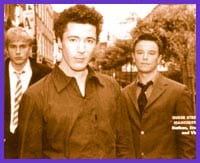Within the first 30 minutes of Queer As Folk, the fab British series about three gay friends in Manchester, a 29-year-old man picks up, rims, fucks and discards a very eager 15-year-old kid, who’s determined to repeat the experience. Meanwhile, on the other side of town, his best friend Vince watches in horror as his trick, a burly middle-aged guy, takes off his girdle and picks lint from his belly button.
Seldom has fucking around looked more disturbing, callous, funny and drop-dead glam than it does in Queer As Folk, the groundbreaking British series that debuts in Toronto at a series of Inside Out brunches this month (and on the full Showcase network Mondays in June).
Not only does it show one-night stands in all their spectacular glory, it admits their imperfections, their variation, their comedy and their antipathy to extended intimacy.
Unlike US series that polarize love and sex, Queer As Folk describes an intricate erotic dance, where friends want to fuck, straight mothers inhabit gay clubs, gay club kids intervene in their parents’ marriages and a conflicted Casanova catches gay society in all its sexy contradictions.
In a move of spectacular audacity, writer/creator Russell T Davies has cast an annoying antihero at the centre of his eight-part comedy drama. A smooth-talking marketing executive, 29-year-old Stuart (Aidan Gillen) is wealthy, attractive, superficial, insensitive and self-absorbed. Yet he draws the affection of both 15-year-old Nathan (Charlie Hunnam), who pursues him with admirable dedication, and his best friend Vince (Craig Kelly), who loves Stuart in an obsessive, dogsbody kind of way that has him picking up the pieces of Stuart’s carefree life.
Together, these three pursue love and friendship against a backdrop of ecstatic club scenes and dire family drama that has no equal in contemporary TV.
Queer As Folk is quite simply breakthrough television. It’s the first series to put us homos at the centre of the drama and pushes straights to the periphery, the first to give an extended sense of gay community and the first to showcase full-throttle, predatory gay cruising. (One episode opens with a bravura montage on the subject.)
Best of all, it’s the first TV program to understand the intense, wayward, quasi-romantic nature of some gay friendships. Vince and Stuart are so close they’re almost a couple. They’ve known each other since they were 14. They talk constantly, interrupting each other’s tricks with cell phone visitations.
But meanwhile, of course, they’re screwing other people. In Stuart’s case, a lot of other people. “Is there anyone you haven’t had?” mutters Vince at, of all places, the funeral of a friend who died tricking.
A Tom Jones for the gay set, Stuart is emblematic of everything that’s both right and wrong about gay life. Impossibly arrogant, he’s one of those people who’s attractive precisely because he knows he’s attractive. But when Nathan and other friends start to demand more of him, Stuart has to reassess his life. And it’s this crisis that provides both the show’s moral force and its giddy romantic suspense. Who will nab Stuart – Nathan, Vince or nobody?
For any gay man who has ever spent much time in a large urban centre, Queer As Folk is an almost unbearably intense experience. Recognition follows recognition, and shock sometimes turns to alarm as the full force of Davies’ pointed observations on everything from closetry to casual sex hits home.
But for the first time in recorded television, the critique arrives between the lines, without heaviness or judgement, because it arises out of Davies’ love for his characters and the hope that they will connect and deepen their bonds.
This is bloody brilliant television.

 Why you can trust Xtra
Why you can trust Xtra


